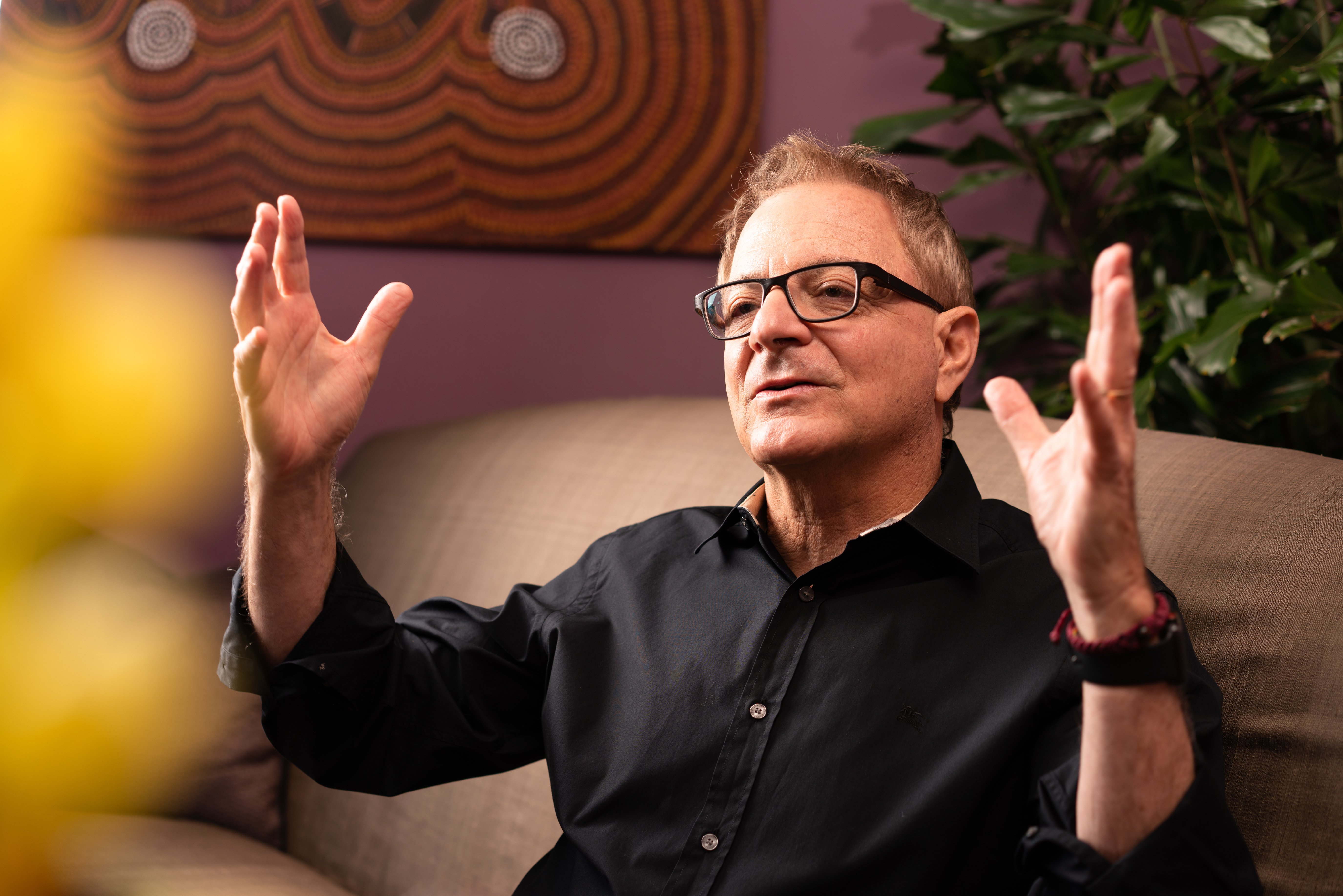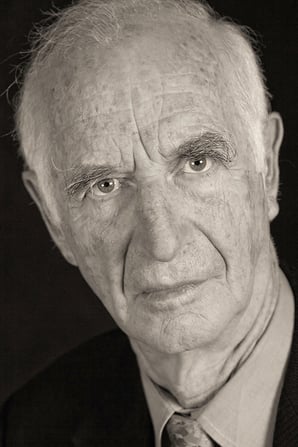An Interview of Stephen Aizenstat by Angela Borda, Part II of II

Stephen Aizenstat, Ph.D.
Pacifica Graduate Institute is like a family, small enough that our faculty, student, and staff are on a first-name basis. A vibrant, eclectic, and above-all intelligent group of people drawn to something deeper. When you walk through Barrett Center, our meeting hall, you feel the presence of those pioneers of mythology and depth psychology who contributed to the founding of this remarkable institute. Scholars like Joseph Campbell, Marion Woodman, and James Hillman, among others. A visit to our special collections will show you just how close to our hearts these visionaries are, as many of their original works and books are housed here. The key to their involvement in Pacifica lies with our Chancellor, Stephen Aizenstat, the founding President of Pacifica. Quick-witted and full of New York moxy, Stephen is a wonderful story teller and innovative thinker, with a personal connection to those elders we take as Pacifica’s lamps in the lighthouse, our beacons of light in the journey into the psyche. I was delighted to speak with Stephen about his experiences with these scholars and also about the continued importance of depth psychology. —Angela Borda
Stephen: I met James Hillman, in Esalen, in the overnight sleeping bag special, where you brought a sleeping bag and grabbed a spot on the floor with twenty other people. I met great people there. One day I was staying there, and next to me was Richard Tarnas, who wrote Cosmos and Psyche, along with number of other books. He asked me, “Have you ever read the work of a man names James Hillman?” He pulled out a book and told me to read a few pages. It was intense, complex, challenging, brilliantly intelligent and poetic, and also contradictory and dense. The day after my Esalen lecture was over, I went to see James Hillman lecture across the bay. I understood 10% of what he said, but he captured my imagination by advocating the idea that psyche and psychology are not only located within a person but out in the world as well. From that moment, the evolution of Pacifica really began. Our motto is right from his lecture, animae mundi colendae gratia, tending the soul of and in the world. I read his seminal work Re-Visioning Psychology, which is an archetypal elaboration on Jungian analytical psychology. That gave a new life to the work we were doing at Pacifica, informing everything from myth to clinical psychology, to CLIE, and now the new program in the humanities. All that comes form Hillman’s work, which infused everything we were doing. The MA counseling in psychology comes right out of our Isla Vista Community Counseling Center and the work we did in counseling psychology. I teach in that program every year, because I believe people in that program have a deep connection to the purpose of Pacifica, and it’s an award-winning program.
 James Hillman, photo credit: Cheryle Van Scoy
James Hillman, photo credit: Cheryle Van Scoy
What sets Pacifica apart: 1. It’s personal. People have an opportunity to go inside and understand their own development and evolution. They take the time to go on the inner journey. 2. Each program is infused and animated with a depth psychological orientation, regardless of what program, with components of myth, literature, and religious traditions. So the liberal arts are very alive in each and every program, which isn’t true of any other graduate psychology program. 3. The training at Pacifica is exceptional. It is experiential, so you combine the content of what’s in the curriculum with an experiential component, so people are actually doing the work and watching others do the work. At Pacifica, the dissertations follow the intention of the student, the topic that brought them here in the first place, the work that wants to move through them and be opened up and looked at more fully. This is rather than the norm in academia, which is graduate students working for a professor or a grant, doing someone else’s work.
What is unique about Pacifica? People are in learning communities. We have a big emphasis on what it means to live in, work in, and creatively be inspired by community. What is it like to be in a community of learners, a community of caring. All of the programs work in cohorts. They come into the cohort and learn what it means to be in depth with colleagues, relationships that go on for decades, for life, people work together, laugh together, cry together, move through their deep processes together, become extraordinary clinicians together. So I see often that alumni are in extended networks, helping one another, a vocational engagement in the world. The mythological department in particular is active in this way, I see our alumni everywhere from the film world to the corporate world’ they’re very alive and active in the culture at the moment.
The mistake that many places make is to abandon their elders and the scholarship of the past. Most tribal societies and countries keep their elders around. You keep that work alive. James Hillman and Joseph Campbell would not have wanted their work taught in a vacuum. It’s the evolution of their work that will be an offering back to the elders. For example, at the end of his life, Hillman asked that the next generation pick up the work and move it into the next century. Marion was deeply invested in her work being picked by others and finding its application in the world. And Joseph’s work is even more relevant today. The idea of the hero’s journey informs the next generation of work, an enormous impact on contemporary thought leaders. We just hosted a group of Emmy-award winning and Grammy-award winning directors, producers, songwriters here at Pacifica. These are the gifted creatives of our time, the people who are orchestrating the next level of cinema, literature, art. And in speaking, all of them went back again and again to the work of Joseph Campbell, how it influenced them and pushed them forward to go deep inside, find the boon, and bring it out into the world. He’s more relevant now than ever.
Pacifica supports people in accessing dreams and hearing the orchestration of the future or the emerging possibility through dream. The gift of Pacifica is in the work of the alumni as they take that work into the world. We ask you to find your own calling, your unique gifts, and by contributing that back to the world, to feel and follow the pull of the future. We want to hear our elder’s deep insight into the future. We’re new leaders at Pacifica, with the next generation of faculty teaching students who will be the teachers of tomorrow.
Curious to hear more? We have a video of James Hillman speaking at Pacifica here. And we invite you to visit our website here to explore our programs, now enrolling for Fall.
Stephen Aizenstat, Ph.D., is Chancellor, founding President of Pacifica Graduate Institute, and Ex-Officio Board of Trustees member. He is a professor of depth psychology with a Ph.D. in clinical psychology, a licensed marriage and family therapist, and a credentialed public school teacher and counselor. He has served as an organizational consultant to companies and agencies worldwide, and teaches extensively. Dr. Aizenstat has explored the potential of dreams through depth psychology and his own research for more than 35 years. His Dream Tending Methodologies extend traditional dreamwork to the vision of an animated world, where the living images in dream are experienced as embodied and originating in both the psyche of Nature and the psyche of persons. His book, Dream Tending, describes multiple applications of dreamwork in relation to health and healing, nightmares, the world’s dream, relationships, and the creative process.
Angela Borda is a writer at Pacifica who is delighted to tell the stories of the remarkable scholars, thinkers, and teachers who make it so unique. She is also a food writer for Food & Home, and the editor of the Santa Barbara Literary Journal.



